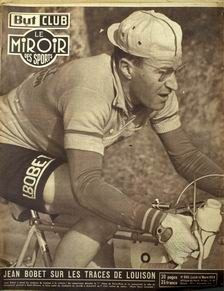Cycling is too hard. Too hard because though you play football or rugby, cycling is something you do. There is a nuance here, if you lose the ball it is only ever a mistake to be forgotten as soon as the ball comes back to you again. If you weaken on a hill, it is a sentence that the next hill will only confirm.
So wrote Jean Bobet, who stood on the podium of Milan San Remo and was a winner of Paris-Nice in 1955. With foul weather everywhere today – the Paris-Nice stage start has been moved because of snow – it reminds us just how hard the sport can be.
Jean Bobet is better known as the brother of Louis Bobet. “Louison” was probably Fausto Coppi’s greatest rival, a status worth of a champion alone but for the record he won the Tour de France three times, Paris-Roubaix, Milan-San Remo, the Tour of Lombardy, Bordeaux – Paris and many more races.
Jean Bobet’s words encapsulate what can make cycling so hard. A footballer can miss a pass, a golfer can slice a drive but once you are dropped in a bike race then often your day is over. I’m not going to blog about cycling being the hardest sport in the world but it’s certainly hard to compete. TV cameras follow the front of the race but often the most epic battles are found behind the bunch, a rider trying to overcome injuries or a rider at the very limit of their abilities who digs as deep as the day’s winner just to finish, only without the publicity, backslapping and pay packet of the race leaders.
Tomorrow, We Read
Bobet’s quote is from his book “Demain on roule” (Tomorrow, we ride), his biographical account of cycling with his more famous brother Louison. An English translation is available. A graduate, he abandoned an early career in teaching and academia to follow his brother. “Tomorrow, we ride” is a good read. Jean Bobet is modest, presumably because he is forced to compare his achievements and abilities to his now legendary brother. His descriptions of 1950’s cycling and the way it approached the rural areas of France, Italy and beyond still rings true today.


I am reading it now (March 2011) and was suprised at Jean’s anger at the Breton mafia’s, 20yrs on in the mid 70s I experienced them and accepted them as the way things were, not my place to object as a english “guest” and indeed I embraced membership of them when it came. But looking back one wonders what if ? Clean races on a level playing field? And do they still operate today?